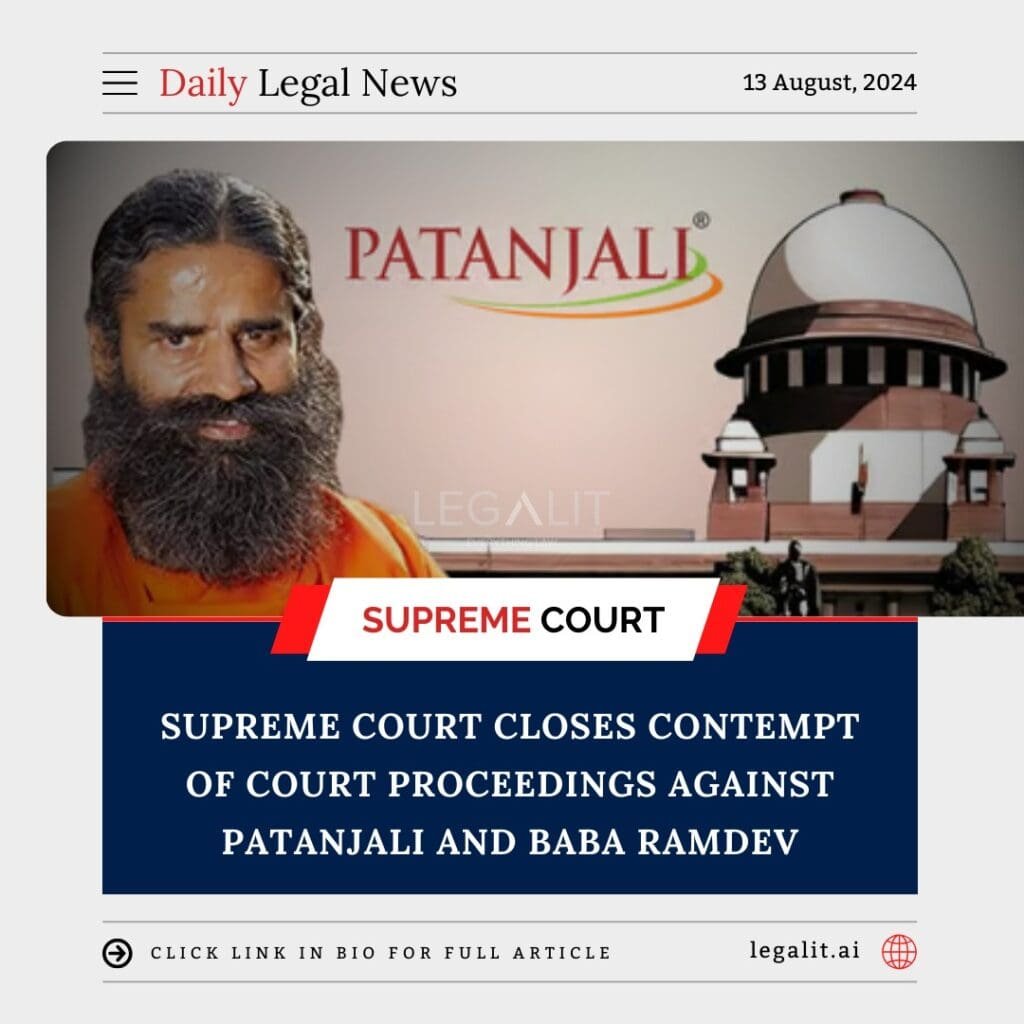
In a notable legal development, the Supreme Court of India has closed contempt of court proceedings against Patanjali Ayurved Limited and its founder, Baba Ramdev. This decision marks the conclusion of a legal issue that had drawn considerable public and media attention, involving allegations of defying court orders.
Background of the Case
The contempt proceedings stemmed from allegations that Patanjali Ayurved and Baba Ramdev had violated court orders related to advertising practices and the promotion of their products. The specifics of the case involved claims that despite judicial directives, Patanjali continued to make certain promotional claims that were deemed misleading or in violation of the court’s earlier rulings.
Contempt of court is a serious offense in India, involving actions that disrespect the authority, justice, and dignity of the court. It can lead to penalties including fines or imprisonment, depending on the severity of the contempt.
Supreme Court’s Decision
- Closure of Proceedings: The Supreme Court decided to close the contempt of court proceedings against Patanjali and Baba Ramdev. The Court likely concluded that the conditions for holding them in contempt were no longer met, or that the issues had been satisfactorily resolved.
- Compliance and Resolution: The closure of the case might indicate that Patanjali and Baba Ramdev took corrective measures to comply with the court’s directives, leading to the resolution of the contempt issue.
- Judicial Discretion: The Court’s decision reflects judicial discretion in assessing whether the actions of the parties warranted continued legal action. The decision to close the proceedings suggests that the Court was satisfied with the explanations or actions taken by the respondents.
Implications of the Ruling
The Supreme Court’s decision to close the contempt proceedings has several important implications:
- Legal Finality: The closure of the proceedings brings finality to the legal dispute between the judiciary and Patanjali, ending a contentious chapter that had significant implications for the company’s public image.
- Corporate Compliance: The ruling serves as a reminder to corporations and public figures about the importance of complying with court orders. It underscores that even high-profile entities are subject to the rule of law and judicial oversight.
- Public Perception: The closure of the case might positively influence public perception of Patanjali and Baba Ramdev, suggesting that they were able to resolve the legal issues satisfactorily.
- Precedent for Future Cases: The decision may set a precedent for how similar cases involving allegations of contempt by high-profile entities are handled by the judiciary. It reinforces the principle that compliance with court orders is critical, but also that the judiciary is open to resolution and closure when appropriate.
Moving Forward
As the case concludes, several takeaways can be considered:
- Continued Vigilance: Entities like Patanjali must remain vigilant in ensuring compliance with legal and regulatory standards to avoid future legal issues.
- Engagement with Legal Frameworks: Companies and public figures should engage proactively with the legal frameworks governing their operations, particularly in areas like advertising and public communications.
- Judicial Oversight: The judiciary’s role in overseeing compliance with its orders remains a crucial check on corporate practices. This case underscores the importance of respecting judicial authority.
- Public Communication: Clear and transparent communication with the public about compliance and legal issues can help maintain trust and credibility, particularly for high-profile companies and individuals.
Conclusion
The Supreme Court’s decision to close the contempt of court proceedings against Patanjali and Baba Ramdev brings an end to a significant legal issue that had raised questions about compliance with judicial orders. The closure of the case reflects the judiciary’s assessment that the matter has been resolved satisfactorily, reinforcing the importance of adhering to the rule of law. As Patanjali and Baba Ramdev move forward, the case serves as a reminder of the need for strict compliance with legal and judicial directives to maintain public trust and uphold the integrity of the legal system.